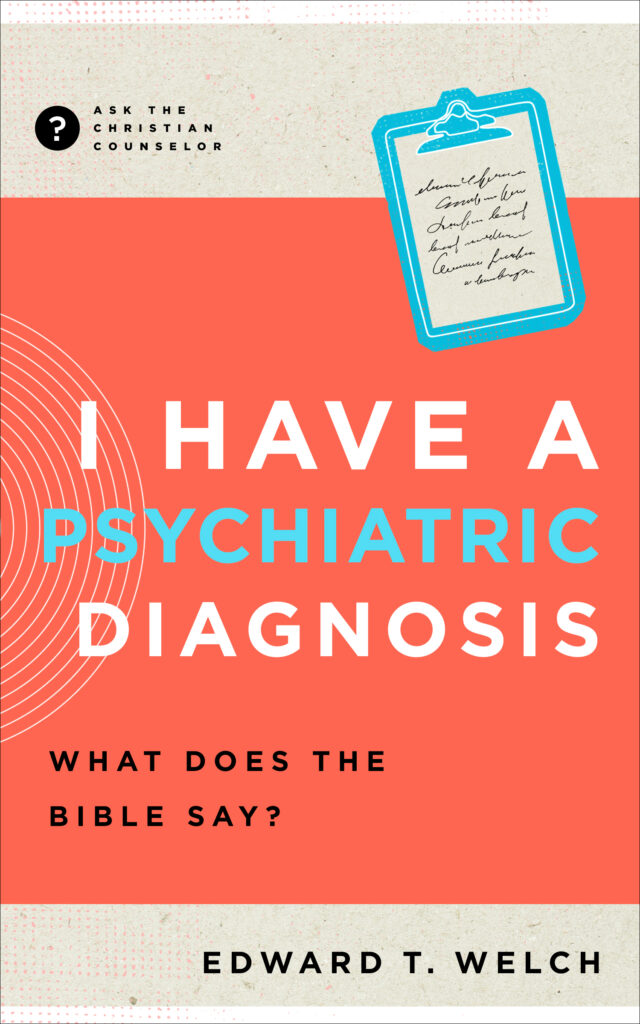Right now you are here: panic disorder, depression, anorexia, obsessive-compulsive personality disorder, attention-deficit/hyperactivity disorder, trauma, substance abuse, bipolar disorder. You are carrying a heavy burden—you or someone you love has a psychiatric diagnosis.
You want to find your way to here:
- What does God say?
- How does the Bible speak in ways that can help you find wisdom, rest, and hope in Jesus, even with a psychiatric diagnosis?
That path is not always easy. It’s as if there are walls between psychological problems and God’s words. Therapists and psychiatrists don’t talk about God; Scripture doesn’t have a list of psychological diagnoses. Two different worlds. One science, the other spiritual. Maybe they each have their own areas of expertise and don’t need to be bridged. Maybe?
Still, we have to do something. The troubles described by psychiatric diagnoses are life dominating. They can be our most pressing problems. It just doesn’t make sense that God is relatively silent on something so important.
And we know he is not silent. God, we can be sure, hears and has compassion for us in this pain. Hear his words to us: “As one whom his mother comforts, so I will comfort you” (Isaiah 66:13a). He is the “God of all comfort” who comforts in a way that our comfort can even overflow to others (2 Corinthians 1:3–4). He is the Lord whose comfort brings peace in all kinds of troubles. (The evidence for Scripture’s words to suffering people is the hundreds of fine books on suffering. A sample of these appears at the end of the book.)
Jesus says, “I have told you these things, so that in me you may have peace. In this world you will have trouble. But take heart! I have overcome the world” (John 16:33, NIV). We know that when Jesus says “overcome” he does not mean complete physical healing and the eradication of all trouble in this life. But he does mean that the life he has given us will reach into the darkness we so often feel (John 10:10), and hope will push back despair.
Do you have doubts about this? Jesus responds to those doubts. He promises—he even swears—that he gives us his presence and power because of what he has done in his death and resurrection (Matthew 28:20). Still have your doubts? He gently points to well-fed birds and colorful daylilies. God cares for them, he says. “Are you not of more value than they?” (Matthew 6:26). If God knows the details of common birds and flowers, which can last only a day, he certainly knows and cares about what troubles you. If comfort seems slow to come, he invites you to ask, “When will you comfort me?” (Psalm 119:82). He will certainly hear you and will bring comfort and much more.
What you need is for these truths to break into your psychological struggles. Your well-being and spiritual growth are at stake.
Notice what occurs with a word such as trauma. You think about chronic abuse or a gruesome event that etched an indelible mark of death on someone’s mind and body. Those past events intrude into present life, as if they are present. Sometimes they intrude as vivid flashbacks. A mere scent, a noise, a word, a scene in a movie, and your body abruptly shuts down and hopes to numb you from the threat. When you want help, your thoughts might go to relaxation techniques, mindfulness, and careful attention to your breathing, though you would settle for staying alive through the storm.
What you do not think is what God says about trauma. Since the word trauma doesn’t appear in Scripture, it seems as though he has little to say about it. His words are spiritual, and spiritual resides in a different world than psychological problems. Spiritual, we think, is about heaven. It is for later, not now.
You Are an Embodied Soul, Not a Pie Chart
The Dutch theologian Abraham Kuyper described our life this way: “There is not a square inch in the whole domain of our human existence over which Christ, who is Sovereign over all, does not cry, Mine!” This means that we want to bring our psychological or psychiatric problems, which have been living apart from God’s words, back to our home in Jesus Christ, and hear how he cares about the details of our lives. In this place he speaks hope to the depressed soul and rest to the anxious heart. He is the rock for those who feel like the present is overwhelming and confusing. From the vantage point of God’s kingdom, from where he says “Mine,” everything is clearer and tinted with hope.
We will continue to gather reliable information and help from the world around us. Such help can have real benefits. Physical struggles might benefit from medical and physical treatments, and the consequences of broken relationships can be seen more clearly through the descriptions found in many good books. But, when God says “Mine,” we gain everything as we re-envision our psychological problems. Careful observations, like those of the mental health sciences, help us to see important things; Scripture reveals what is most important. It opens our eyes to what is unseen and eternal.
A Plan Forward
Here is our basic approach.
• Listen to God and get help from his people.
• Listen and learn from those who have experience.
Their order is not important, though we should always give God the final word.
Your work might begin when you learn something about a psychiatric diagnosis from those with experience. These sources can include friends, therapists, doctors, and reliable materials. You recognize yourself or someone you love in the descriptions—“OCD,” “bipolar disorder,” “borderline,” and so on—and those words are important. They help you identify something for which you previously had no words. They might even bring a measure of relief. You feel known. “That’s me.” You finally feel understood. It is difficult to do anything until you put those hard-to-express experiences into speech.
What next? Listen to God. What does he say? What does Scripture say? These questions will remind you to bring what you have learned back to God’s house, where you listen to him and his people. Here, the words you have heard in the world around you will be reshaped and you will see more. Scripture, it turns out, functions as corrective lenses that open your eyes.
These two approaches anchor the rhythm in what is ahead—listen to Scripture and God’s people, listen to those who have experience, listen to what God says. Back-and-forth. Listen, learn, ask for help. The cycle continues until you understand your struggles (or another’s struggles) better and have ways to help. What is important is that Scripture has the final words of hope.
God’s Words to You
There will be times when you bring what you have heard back to Scripture, and you hear nothing. At those times, here are words you can count on.
- Jesus says, “Speak to me.”
- Jesus says, “Believe the gospel.”
These will be your entrance into God’s house.
Excerpt adapted from I Have a Psychiatric Diagnosis: What Does the Bible Say? © 2022 by Edward T. Welch. May not be reproduced without prior written permission.
I have a Psychiatric Diagnosis: What does the Bible say?
A psychiatric diagnosis can be heavy burden—for you or someone you love. But we know this: God is not silent when his people struggle. What does God say? Edward T. Welch helps you answer that crucial question by exploring how God’s Word speaks in ways that can help you find wisdom, rest, and hope in Jesus, even with a psychiatric diagnosis.






